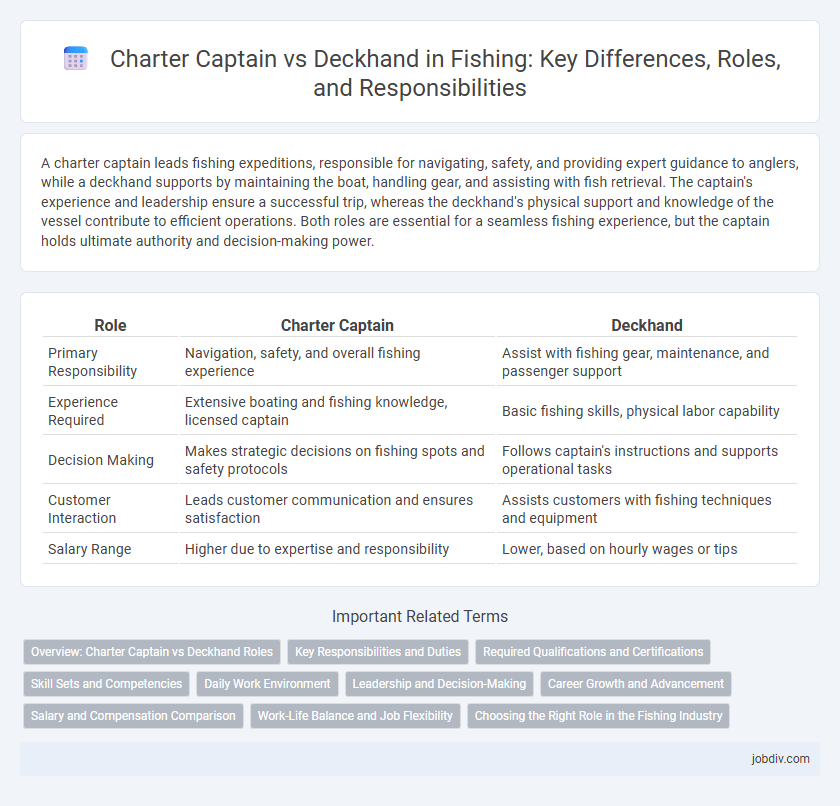A charter captain leads fishing expeditions, responsible for navigating, safety, and providing expert guidance to anglers, while a deckhand supports by maintaining the boat, handling gear, and assisting with fish retrieval. The captain's experience and leadership ensure a successful trip, whereas the deckhand's physical support and knowledge of the vessel contribute to efficient operations. Both roles are essential for a seamless fishing experience, but the captain holds ultimate authority and decision-making power.
Table of Comparison
| Role | Charter Captain | Deckhand |
|---|---|---|
| Primary Responsibility | Navigation, safety, and overall fishing experience | Assist with fishing gear, maintenance, and passenger support |
| Experience Required | Extensive boating and fishing knowledge, licensed captain | Basic fishing skills, physical labor capability |
| Decision Making | Makes strategic decisions on fishing spots and safety protocols | Follows captain's instructions and supports operational tasks |
| Customer Interaction | Leads customer communication and ensures satisfaction | Assists customers with fishing techniques and equipment |
| Salary Range | Higher due to expertise and responsibility | Lower, based on hourly wages or tips |
Overview: Charter Captain vs Deckhand Roles
Charter captains hold the primary responsibility for navigating the vessel, ensuring safety, and managing the overall fishing experience for clients. Deckhands support the captain by handling fishing gear, assisting with catch processing, and maintaining the cleanliness and functionality of the boat. Both roles are essential for successful fishing charters, with the captain leading operations and the deckhand providing critical hands-on support.
Key Responsibilities and Duties
The Charter Captain oversees navigation, ensures passenger safety, and manages all aspects of the fishing trip, including regulatory compliance and equipment maintenance. The Deckhand supports the captain by handling fishing gear, assisting with fish cleaning, managing lines, and maintaining the vessel's cleanliness and order. Both roles require knowledge of marine safety protocols, but the captain holds ultimate responsibility for the vessel and the success of the outing.
Required Qualifications and Certifications
Charter captains typically require a U.S. Coast Guard captain's license, extensive maritime training, and proven navigation skills to ensure passenger safety and regulatory compliance. Deckhands must hold basic first aid certification, a transportation worker identification credential (TWIC), and often complete on-the-job training for gear handling and vessel maintenance. Both roles prioritize safety knowledge, but captains have higher certification standards focused on leadership and vessel operation.
Skill Sets and Competencies
Charter Captains possess advanced navigational skills, in-depth knowledge of marine regulations, and expertise in fish behavior to ensure a successful and safe fishing expedition. Deckhands specialize in gear handling, bait preparation, and maintaining the vessel, requiring physical stamina and proficiency in knot tying and fish cleaning. Both roles demand strong communication abilities and teamwork to optimize fishing efficiency and customer satisfaction on charter trips.
Daily Work Environment
A charter captain oversees navigation, safety protocols, and client experience while managing weather conditions and fishing locations on the vessel. Deckhands perform hands-on tasks such as baiting hooks, handling fishing gear, maintaining the boat, and assisting passengers during fishing activities. The daily work environment for captains is strategic and supervisory, whereas deckhands experience more physical labor and continuous interaction with equipment and anglers.
Leadership and Decision-Making
Charter captains hold primary leadership roles, responsible for navigating, managing the crew, and making critical decisions to ensure safety and a successful fishing trip. Deckhands execute the captain's directives, handle fishing gear, and manage the catch, supporting operations through physical labor rather than strategic leadership. Effective fishing expeditions rely on the captain's expertise in decision-making combined with the deckhand's operational support.
Career Growth and Advancement
Charter Captains have greater opportunities for career growth and advancement through obtaining captain licenses, gaining navigation expertise, and building client relationships, which can lead to higher earnings and business ownership. Deckhands typically advance by acquiring boating skills, safety certifications, and assisting in vessel maintenance, often moving up to mate positions before qualifying as a captain. The career path of a Charter Captain involves more responsibility and specialized knowledge, offering long-term professional development compared to the entry-level role of a Deckhand.
Salary and Compensation Comparison
Charter captains typically earn between $50,000 and $90,000 annually, with some seasoned captains making over $100,000 due to tips and high-end charters, while deckhands usually earn significantly less, averaging around $25,000 to $40,000 per year. Compensation for captains often includes bonuses, tips, and profit-sharing opportunities, contrasting with deckhands whose income mainly depends on hourly wages and low-tier tips. Salary disparities reflect the captains' specialized skills, certifications, and leadership roles compared to the more manual labor-focused responsibilities of deckhands.
Work-Life Balance and Job Flexibility
Charter captains generally enjoy greater job flexibility, setting their own schedules and deciding when to take clients out, which enhances work-life balance despite high responsibility levels. Deckhands face more rigid hours and physically demanding tasks, often requiring early mornings and long days on the water, limiting personal time and flexibility. While captains manage business operations and client interactions, deckhands focus on labor-intensive support roles, leading to distinct differences in work-life balance priorities.
Choosing the Right Role in the Fishing Industry
Selecting the right role in the fishing industry depends on skills, experience, and career goals; a charter captain must possess strong leadership, navigation, and customer service abilities, while a deckhand focuses on hands-on tasks like baiting hooks, handling nets, and maintaining equipment. Charter captains take responsibility for trip planning and safety, making strategic decisions to ensure successful fishing excursions, whereas deckhands support operations and require physical stamina and teamwork. Understanding these distinct roles helps individuals align their strengths with industry demands for a rewarding fishing career.
Charter Captain vs Deckhand Infographic

 jobdiv.com
jobdiv.com